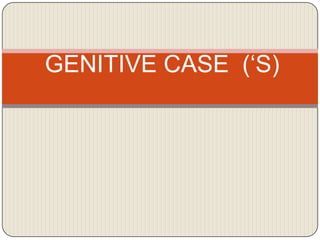
Caso genitivo
- 1. GENITIVE CASE (‘S)
- 2. O caso genitivo em inglês é representado por (´S) ou apenas por um apóstrofo (´) . Ele exprime uma relação entre dois ou mais elementos, e essa relação é principalmente uma relação de posse.
- 3. Qual a função do apóstrofo?
- 6. ESTRUTURA: POSSUIDOR ´S OBJETOPOSSUÍDO The book ofthe boy Theboy´s book
- 7. Usa –se quando o possuidor for uma pessoa, ou animal, ou um nome que represente um grupo de pessoas. Caso contrário, usa-se a estrutura Substantivo + of + Substantivo USO:
- 9. O ´S é colocado após um nome possuidor no singular,mesmo que este termine em S.
- 10. Thecarof John John´scar Therulerof Charles Charles´sruler
- 11. Substantivos no plural terminados em S recebem apenas o apóstrofo para formar o caso genitivo.
- 12. Thetoysofthe girls The girls ´toys BUT The books ofthechildrenthechildren´s book
- 13. Nomes próprios de vultos históricos, bíblicos ou pessoas famosas terminadas em S apenas recebem o apóstrofo para a formação do caso genitivo.
- 14. Thedeathof Jesus Jesus´death
- 15. Nomes próprios de pessoas comuns, mesmo terminados em S recebem o ´S para a formação do caso genitivo.
- 16. Therulerof Charles Charles´sruler
- 17. Substantivos compostos recebem o ´S na última palavra.
- 18. Thebroomofmymother- in – law. Mymother-in –law´sbroom.
- 19. Quando há mais de um possuidor para a mesma coisa possuída, usa-se o ´S ou somente ` no ultimo nome empregado.
- 20. Thehouseof Peter and John. Peter andJohn´s house.
- 21. Caso cada possuidor possua seu próprio objeto, então o ´S ou somente ´ é empregado em todos os nomes.
- 22. ThegoalsofMessiand Daniel Messi´s andDaniel´s goals.
- 23. O caso genitivo também pode ser empregado para se referir a lojas, consultórios ou outros lugares públicos, bem como fazer menção a casa da pessoa citada.
- 24. I´m going to thebaker´s (shop) We´lldineatmyaunt´s (house) Shewent to thedoctor´s (office)
- 25. O caso genitivo também pode ser empregado para expressões de tempo,peso e medida. A hardday´snight.(tempo) A pound´sweight.(peso) A bed´sbreadth. (medida)
- 26. Algumas expressões idiomáticas. (´S) TheJourney´s end. For God´ssake.
- 27. 1 -(FAAP – SP) Mary does not like her _____ clothes a)brother b)brothers’s c)brother’s d)of brother e) brother´ 2 - (ESAN – SP) Hamlet is one of _________ tragedies a)Shakespeare b)Shakespeare’s c)Shakespeares d)Shakespeares’s e) Shakes´speares
- 28. 3 - (FMU – SP) This is _______________ a)Mr. Smith’s hat b)Mr. Mr. Smith’s hat’s c)The hat of Mr. Smith’s d)The Mr. Smith’s hat e) Mr´s Smith hat 4 - (FAAP – SP) Choose the correct answer a)The father of Henry and John is in Germany b)Henry and John’s father is in Germany c)Henry’s and John’s father is in Germany d)Henry’s and John father is in Germany e) Henry and John father´s is is Germany
- 29. 5 -(ITA – SP) Quanto às frases: Peter’s house is different from Wilson The children’s uncle were present The girl’s dolls are expensive a) A I estáerrada b) A I e a III estão corretas c) A I está correta d) Todas estão corretas e) Todas estão incorretas
- 30. 6 - (ALFENAS) Assinale a correta quanto ao caso genitivo a)Joe’s and Peter’s father is a good man b)Joe and Peter’s father is a good man c)Joe and Peter’s fathers are good man d)Joe’s and Peter’s fathers are good man e)Joe’s and Peter’s fathers is a good man 7 - (CEUMA) My brother’s wife is my a) daughter-in-law b) mother-in-law c) sister-in-law d)son-in-law e)brother-in-law 8 - (UEM – PR) “Is this your car ?” “No, it’s not. It’s ________” a)John’s b)Of John’s c)The John’s d)Of the John e)John